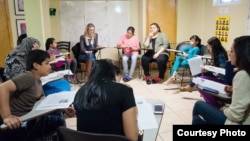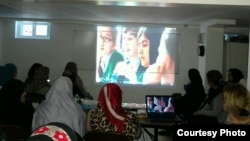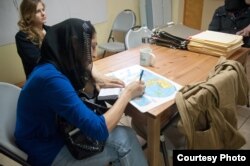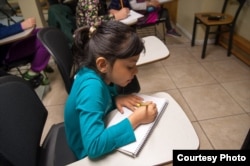Every day in a modest home in Queens, New York, more than 100 women of Afghan descent are crammed into makeshift classrooms. They are learning the basics of life in America, such as getting a driver's license or reading and writing English, but they also can gain help with something as complex and critical as dealing with an abusive spouse.
The program is run by Women for Afghan Women (WAW), a women's advocacy group. The participants are a mixture of single, married and divorced women. Some are newly arrived to America, while others have been here for several years. Their mentors and teachers are mostly Afghan-Americans who are naturalized American citizens.
Supported with state and federal money, WAW was formed prior to the September 11, 2001, terror attacks to help Afghan women overcome illiteracy and domestic violence in Queens' Afghan community.The organization beefed up its program after the U.S.-led invasion of Afghanistan, redoubling efforts to educate and deal with community fears.
In New York, according to the Afghan Consulate and local mosques, the Afghan population is estimated at 20,000 families. The Afghan community traditionally has been a patriarchal society, with women in more submissive roles.That can lead to spousal abuse, fewer education opportunities and other issues resulting from a lack of rights.
Safety first
Manizha Naderi, WAW's executive director, said, "We're trying to make sure Afghan women are safe. Our aim is for women to have access to education, justice, so they can be normal citizens."
WAW also wants to change ingrained cultural habits.
"It's not an easy task where decades of gender imbalance has been going on," said Naderi. "We work with the communities — not just women, but with the families — because Afghanistan is a patriarchal society, and women don't want to leave their families.They just want to be safe within their families."
Sitara Momand, 43, came to New York in 2013 as a divorcee with a young daughter.
"I was married to a very violent husband," Momand told VOA. "We were living with my in-laws but could not take the violence from my ex-husband and my in-laws any longer. I left Afghanistan and went to Pakistan to escape the violence. Then I came to America."
Hired by group
Momand had heard about WAW, and it was one of her first stops. She needed money. WAW hired her as a housekeeper. Ultimately, she found her own place to live.
"WAW helped me get public benefits, helped getting my child in school, and helped me learn to read and write in English," said Momand. She continues to work at WAW and has a second job in a restaurant. She says she is very happy to be living in America.
Yalda Afif, a program coordinator at WAW, deals with many women who have been abused by their husbands and in-laws.
"I have seen terrible abuse, sexual abuse by their partners," Afif told VOA. "But they kept the information to themselves; they never opened up about it. Then, after being here, they started to trust us, and I learned more about what was really going on, the root of the problems."
Afif added, "We try to make the family understand that they cannot control everything; they have to share with their wives. If a woman gets empowered, gets a job, she is taking a burden from the shoulders of the man."
Crucial basic skills
In addition to helping women get jobs and places to live, Women for Afghan Women places great emphasis on education.
WAW helped Faozia Noory, 42, a naturalized U.S. citizen who has been in the United States for eight years, prepare for her citizenship exam and helped her get a driving permit. She is happily married with four children and said, "This is home, sweet home, for me. I like the feeling of being safe."
Skills also are taught to younger Afghan-Americans in WAW's Young Leadership Program.
"These are primarily young women, some as young as 15. Some had been forced into marriages they didn't want," said Naderi. "We teach them empowerment, how to ask for their rights, what their rights are, what the rights of women in Islam are, and what the rights of the family are. And, you know, education is the key to it, to everything."
According to Naderi, since the girls leadership program began in 2005, not one girl in the community has been forced to marry.
What about Afghanistan?
WAW has taken its programs back to Afghanistan. It has child support centers in 13 provinces and provides legal support to abused women through its facility in Kabul. Trying to develop a positive attitude about women in the workforce, the organization has struck a nerve in the male-dominated society.
"We've been targeted by the Taliban," Naderi said. "In 2014 ,two of the WAW staff were kidnapped by the Taliban. Their release came in 2015 with the interjection and help of local Afghan communities. Change can be very difficult."







